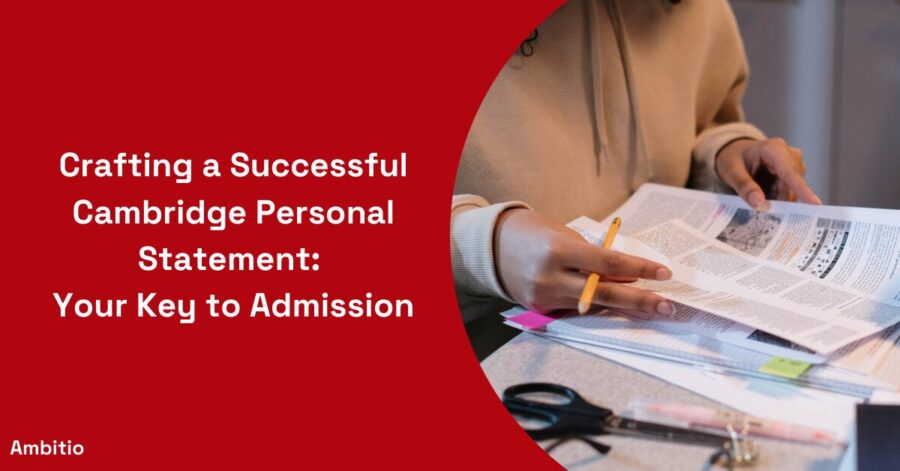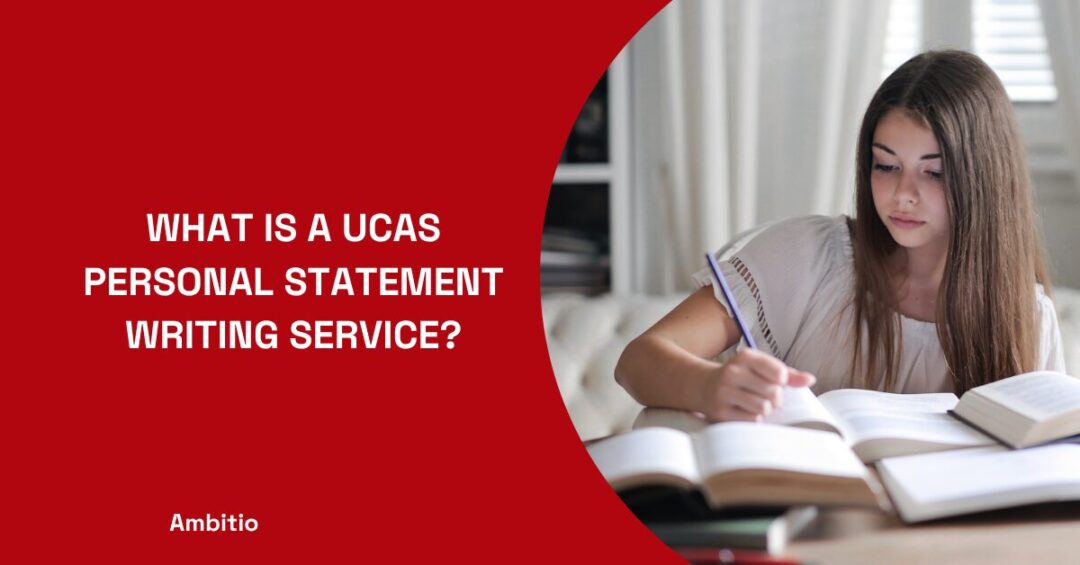12 December 2024
8 minutes read
Crafting a Successful Cambridge Personal Statement: Your Key to Admission

Your dream of studying at the renowned University of Cambridge is within reach, but there’s a critical step you must conquer: crafting a compelling Cambridge personal statement.
In this comprehensive guide, we’ll explore everything you need to know about creating a standout personal statement that will capture the attention of admissions tutors and help you secure a place at this prestigious institution.
Understanding the Cambridge Personal Statement
What is a Cambridge Personal Statement?
A Cambridge personal statement is your opportunity to showcase your passion, qualifications, and suitability for the course you’re applying to. It’s a crucial part of the UCAS application process for prospective students seeking admission to the University of Cambridge, often referred to simply as “Cambridge.”
Why is the Cambridge Personal Statement Important?
The Cambridge personal statement plays a pivotal role in your application, allowing you to demonstrate your enthusiasm for your chosen subject and highlight relevant academic and non-academic experiences. It helps admissions tutors assess your ability and potential to thrive at Cambridge.
How Do Admissions Tutors Evaluate Personal Statements?
Admissions tutors are looking for several key elements in your personal statement:
- Passion for your chosen subject
- Evidence of academic achievements and qualifications
- Relevant extracurricular activities and achievements
- A clear alignment between your background, experiences, and the course you’re applying for
- A demonstration of broader skills and interests
In this chapter, we’ll dive deeper into each of these aspects and provide tips on how to effectively address them in your personal statement.
Crafting Your Cambridge Personal Statement
Starting Early
Begin working on your personal statement well in advance. Give yourself time to brainstorm, draft, and revise. Starting early ensures you have ample opportunity to perfect your statement.
Theme Each Paragraph
Structure your statement with a clear theme for each paragraph. This approach makes your statement more organized and engaging to read.
Showcasing Your Academic Interests
Highlight your passion for your chosen subject. Discuss how your academic interests have developed over time and any relevant coursework, reading, or research you’ve undertaken.
Discussing Extracurricular Activities
Cambridge values well-rounded individuals. Mention extracurricular activities that showcase your interests, leadership, and personal development.
Tailoring Your Statement
Customize your personal statement for the specific course you’re applying to at Cambridge. Address why you’re passionate about that subject and how it aligns with your future goals.
Be Genuine
Admissions tutors appreciate authenticity. Write in your own voice and be honest about your motivations and experiences.
Seeking Feedback
Ask teachers, advisors, or peers to review your statement. Their feedback can help you refine your writing and catch any errors.
Time Management
Effective time management is crucial. Avoid procrastination and allocate sufficient time to each stage of the writing process.
In this chapter, we’ll delve into each of these steps in detail, offering valuable insights and tips to help you create a standout Cambridge personal statement.
The Anatomy of a Winning Cambridge Personal Statement
Word Count and Formatting
Your Cambridge personal statement should be approximately 4,000 characters, including spaces. Ensure proper formatting and structure to make your statement easy to read.
Introduction
Your introduction should grab the reader’s attention and provide a brief overview of your interest in the subject.
Academic Achievements
Detail your academic accomplishments, including relevant qualifications, courses, and projects.
Passion for the Subject
Express your enthusiasm for the subject you’re applying for. Share how your interest developed and why you’re eager to study it at Cambridge.
Extracurricular Activities
Highlight your involvement in extracurricular activities, clubs, or organizations that demonstrate your leadership, teamwork, and personal growth.
Relevant Work Experience or Research
Discuss any work experience or research that is pertinent to your chosen field of study.
Alignment with Course and Future Goals
Explain why you believe the course at Cambridge is the perfect fit for your academic and career aspirations.
Conclusion
Summarize your key points and reiterate your passion for the subject and your eagerness to study at Cambridge.
Standing Out in Your Cambridge Application
Crafting a Unique Story
Find your unique narrative and experiences to make your personal statement memorable.
Researching Cambridge Colleges
Learn about the various Cambridge colleges and tailor your statement to fit the culture and ethos of your preferred college.
The Cambridge Interview
Prepare for the Cambridge interview, an essential part of the admission process.
Supplementary Application Questionnaire
Understand and complete the supplementary application questionnaire, if required for your course.
In this chapter, we’ll provide in-depth guidance on these aspects to help you make your application truly shine.
Success Stories – Real Cambridge Personal Statements
To truly understand what makes a Cambridge personal statement successful, let’s dive into real-life examples of personal statements that helped candidates secure a coveted place at the University of Cambridge. By examining these success stories, you can gain valuable insights into crafting your own compelling personal statement.
Success Story 1: Sarah’s Journey to Cambridge
Course Applied for: Natural Sciences
Sarah’s personal statement stood out because of her genuine passion for the subject. Here are some key aspects of her statement:
Passion for the Subject: Sarah began her statement with a captivating anecdote about her childhood fascination with the natural world. She vividly described her experiences exploring nature and how they ignited her curiosity.
Academic Achievements: She provided a concise list of her academic achievements, including top grades in science and mathematics subjects. These achievements supported her claim of being academically prepared for the rigorous Natural Sciences program.
Relevant Extracurricular Activities: Sarah didn’t just mention her love for science; she backed it up with her participation in science clubs, science Olympiads, and even science-related volunteer work. Her extracurricular activities demonstrated her commitment to the subject.
Alignment with the Course: Sarah clearly articulated why she wanted to study Natural Sciences at Cambridge. She discussed specific areas of interest, such as evolutionary biology and astronomy, and explained how her prior experiences had shaped her interests.
Conclusion: In her conclusion, Sarah reiterated her unwavering passion for the subject and her strong desire to study at Cambridge. Her closing statement left a lasting impression on the admissions tutors.
Success Story 2: James’ Unique Perspective
Course Applied for: Archaeology
James took a unique approach in his personal statement by sharing his experiences as a participant in archaeological fieldwork. Here’s what made his statement stand out:
Personal Experience: Instead of focusing solely on academic achievements, James delved into his hands-on experience in archaeology. He described the excavations he had participated in and the thrill of discovering ancient artifacts.
Academic Interests: While emphasizing his practical experience, James also connected it to his academic interests. He discussed how his fieldwork experiences had influenced his desire to study archaeology at a higher level.
Reflective Writing: James used reflective writing effectively. He discussed how certain archaeological findings had led to introspection about human history and the importance of preserving our heritage.
Future Goals: James concluded his statement by outlining his future goals, expressing a desire to contribute to archaeological research and preservation efforts.
Unique Perspective: What set James apart was his unique perspective as a participant in archaeological excavations. His statement showcased his enthusiasm and commitment to the field.
Success Story 3: Maria’s Academic Excellence
Course Applied for: Mathematics
Maria’s personal statement emphasized her strong academic background and her eagerness to tackle challenging mathematical problems. Here’s what made her statement compelling:
Academic Excellence: Maria began her statement by listing her exceptional achievements in mathematics, including participation in math competitions and high scores in advanced math courses.
Problem-Solving Skills: She showcased her passion for solving complex mathematical problems by describing personal projects and independent research she had undertaken.
Extracurricular Engagement: While her focus was primarily on academics, Maria also briefly mentioned her involvement in math-related clubs and tutoring, demonstrating her dedication to the subject.
Clear Goals: Maria clearly outlined her goals, expressing her desire to pursue a Ph.D. in mathematics and contribute to mathematical research. Her statement conveyed a long-term commitment to the field.
Conclusion: In her conclusion, Maria tied everything together by reiterating her love for mathematics and her determination to excel in the subject. Her unwavering focus on math left a strong impression.
By analyzing these success stories, you can see that there’s no one-size-fits-all approach to crafting a Cambridge personal statement. Each candidate showcased their unique strengths, experiences, and passion for their chosen subjects. The common thread among them was the ability to communicate their enthusiasm and suitability for their respective courses effectively.
Beyond Cambridge – Applying to Oxford and Other Universities
While securing admission to the University of Cambridge is a prestigious achievement, it’s essential to explore other options and consider applying to similar elite institutions, such as the University of Oxford, as well as other renowned universities. This chapter will guide you through the nuances of applying to these institutions and help you make informed decisions about your academic future.
1. The University of Oxford
Similarities with Cambridge:
- Like Cambridge, Oxford is a world-renowned institution located in the United Kingdom, known for its academic excellence and rich history.
- The application process at Oxford shares similarities with Cambridge, including the use of UCAS and the requirement for a personal statement.
Key Differences:
- Course structure: Oxford’s course structure may differ from Cambridge, even in similar subjects. Research the course details and requirements for your specific field of study.
- College system: Oxford also has a college system, and your choice of college can impact your academic experience. Research colleges to find the best fit for you.
- Interview process: Oxford conducts interviews as part of its admission process, similar to Cambridge. Prepare thoroughly for these interviews, as they play a significant role in the selection process.
2. Top International Universities
In addition to Cambridge and Oxford, consider top international universities, particularly if you’re open to studying abroad. Institutions such as Harvard, Stanford, MIT, and others offer world-class education and diverse academic opportunities. Here are some key points to consider:
Admission Requirements:
- Research the specific admission requirements for international universities. These may include standardized tests like the SAT or ACT, language proficiency exams (such as the TOEFL or IELTS), and application essays.
- Understand the application deadlines, as they vary by university and country.
Financial Considerations:
- Investigate scholarships and financial aid options for international students. Many universities offer scholarships based on academic merit or specific talents.
Visa and Immigration:
- Be aware of visa and immigration requirements for studying abroad. Ensure you have the necessary documentation to study in your chosen country.
Cultural Adaptation:
- Prepare for cultural differences and be open to experiencing a new way of life. Embrace diversity and engage in the local community to make the most of your international educational experience.
3. Other Renowned UK Universities
The UK boasts several other prestigious universities, each with its strengths and unique programs. Some well-regarded institutions include Imperial College London, the London School of Economics and Political Science (LSE), and the University of Edinburgh, among others. Here’s how to navigate the application process:
Course Selection:
- Research the courses and programs offered by these universities. Ensure they align with your academic interests and career goals.
Admission Criteria:
- Understand the admission criteria, including academic requirements and any additional assessments or interviews.
Location and Lifestyle:
- Consider the location of the university and the lifestyle it offers. Each city has its unique charm and opportunities.
International Student Support:
- Explore the support services available to international students, including accommodation, visa assistance, and cultural integration programs.
4. Making Your Decision
Applying to multiple universities, including Cambridge, Oxford, and other prestigious institutions, provides you with options and ensures you find the best fit for your academic journey. Here are some tips for making your decision:
Ranking and Reputation: Consider university rankings and reputation in your field of study. However, remember that the best university for you might not always be the highest-ranked one.
Course Content: Review the course content and structure to determine which university offers the curriculum that aligns with your academic interests and career aspirations.
Financial Considerations: Evaluate the cost of tuition, living expenses, and the availability of scholarships or financial aid packages.
Location and Lifestyle: Think about your preferred location, lifestyle, and cultural experiences. Some students thrive in bustling cities, while others prefer quieter towns.
Personal Preferences: Trust your instincts and personal preferences. Where do you feel most comfortable and excited to study?
Conclusion
Crafting a successful Cambridge personal statement is a crucial step towards securing admission to this esteemed university. Use your personal statement to showcase your passion, qualifications, and suitability for your chosen course.
With careful planning and thoughtful writing, you can stand out and make a compelling case for why you belong at Cambridge. Best of luck with your application!
FAQs
Are there specific guidelines for the Cambridge personal statement?
While there are no strict guidelines, your statement should be around 4,000 characters (including spaces).
How do admissions tutors evaluate personal statements?
Admissions tutors assess your statement for passion, suitability for the course, academic achievements, and evidence of broader skills and interests.
Can I apply to both Cambridge and Oxford?
Yes, you can apply to both universities, but you’ll need to submit separate applications and personal statements.
Can a personal statement make or break my application?
While other factors are considered, a well-crafted personal statement can significantly impact your application’s success.

You can study at top universities worldwide!
Get expert tips and tricks to get into top universities with a free expert session.
Book Your Free 30-Minute Session Now! Book a call now




























